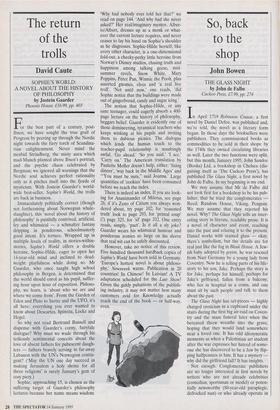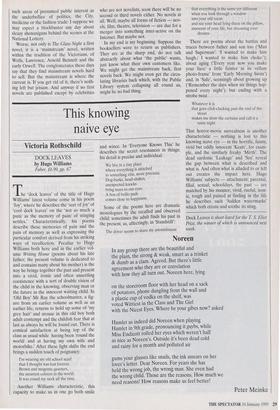So, back to the shop
John Bowen
THE GLASS NIGHT by John de Falbe Cuckoo Press, £7.99, pp. 274 In April 1719 Robinson Crusoe, a first novel by Daniel Defoe, was published and, we're told, the novel as a literary form began. In those days the booksellers were publishers. They commissioned books as commodities to be sold in their shops: by the 1740s they owned circulating libraries as well. Later the two functions were split, but this month, January 1995, John Sandoe (Books) Ltd, a bookshop in Chelsea (dis- guising itself as The Cuckoo Press'), has published The Glass Night, a first novel by John de Falbe. In my beginning is my end.
We may assume that Mr de Falbe did not look first for a bookshop to be his pub- lisher, that he tried the conglomerates Reed, Random House, Viking, Penguin. We may assume that they rejected his novel. Why? The Glass Night tells an inter- esting story in literate, readable prose. It is a novel of character and event, reaching into the past and relating it to the present. Daniel works with stained glass — okay, there's symbolism, but the details are for real just like the fog in Bleak House. A Jew- ish baby adopted by goyim, he was rescued from Nazi Germany by a young lady from Coventry. Now he is telling parts of his life- story to his son, Jake. Perhaps the story is for Jake, perhaps for himself, perhaps for Jake's girlfriend, fallen from a balcony, who lies in hospital in a coma, and one must sit by such people and talk to them about the past.
The Glass Night has set-pieces — highly charged eroticism in a cupboard under the stairs during the first big air-raid on Coven- try and the mass funeral later when the bereaved threw wreaths into the grave, hoping that they would land somewhere near a loved one. It has odd idiosyncratic moments as when a Palestinian art student after the war expresses her hatred of some- one she has discovered to be a Jew by flip- ping halfpennies at him. It has a mystery why did the girlfriend fall? It has insights.
Not enough. Conglomerate publishers are no longer interested in first novels by writers who are not already celebrities (comedian, sportsman or model) or poten- tially newsworthy (80-year-old paraplegic, defrocked nun) or who already operate in such areas of presumed public interest as the underbellies of politics, the City, medicine or the fashion trade: I suppose we may expect a blockbuster any day about sleazy shenanigans behind the scenes at the National Lottery.
Worse, not only is The Glass Night a first novel, it is a 'mainstream' novel, written within the tradition of the Victorians, of Wells, Lawrence, Arnold Bennett and the early Orwell. The conglomerates these days say that they find mainstream novels hard to sell. But the mainstream is where the current is. If you get rid of it, there's noth- ing left but jetsam. And anyway if no first novels are published except by celebrities
who are not novelists, soon there will be no second or third novels either. No novels at all. Well, maybe all forms of fiction — nov- els, film, theatre, television — are due for a merger into something inter-active on the Internet. But maybe not.
In my end is my beginning. Suppose the booksellers were to return as publishers. They are at the sharp end, do not talk abstractly about what 'the public' wants, just know what their own customers like. We might get the mainstream back, first novels back. We might even get the circu- lating libraries back which, with the Public Library system collapsing all round us, might be no bad thing.










































 Previous page
Previous page